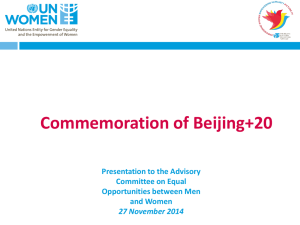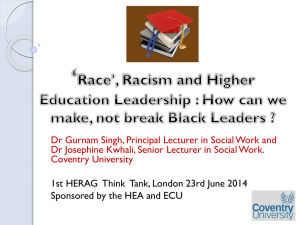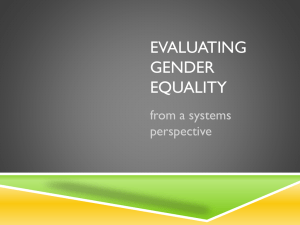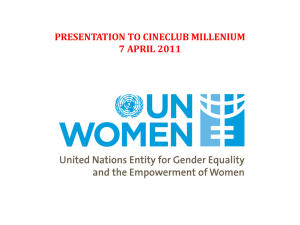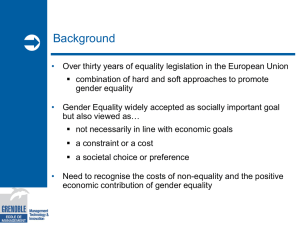Making Europe Better for Women
advertisement
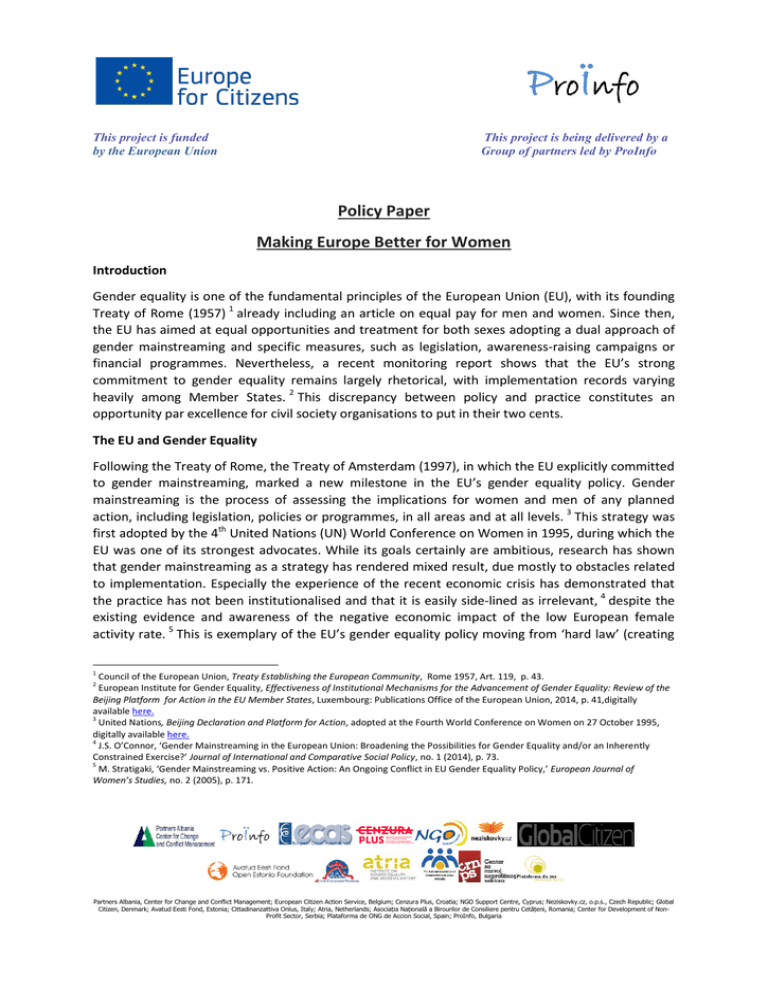
ProÏnfo This project is funded by the European Union This project is being delivered by a Group of partners led by ProInfo Policy Paper Making Europe Better for Women Introduction Gender equality is one of the fundamental principles of the European Union (EU), with its founding Treaty of Rome (1957) 1 already including an article on equal pay for men and women. Since then, the EU has aimed at equal opportunities and treatment for both sexes adopting a dual approach of gender mainstreaming and specific measures, such as legislation, awareness-raising campaigns or financial programmes. Nevertheless, a recent monitoring report shows that the EU’s strong commitment to gender equality remains largely rhetorical, with implementation records varying heavily among Member States. 2 This discrepancy between policy and practice constitutes an opportunity par excellence for civil society organisations to put in their two cents. The EU and Gender Equality Following the Treaty of Rome, the Treaty of Amsterdam (1997), in which the EU explicitly committed to gender mainstreaming, marked a new milestone in the EU’s gender equality policy. Gender mainstreaming is the process of assessing the implications for women and men of any planned action, including legislation, policies or programmes, in all areas and at all levels. 3 This strategy was first adopted by the 4th United Nations (UN) World Conference on Women in 1995, during which the EU was one of its strongest advocates. While its goals certainly are ambitious, research has shown that gender mainstreaming as a strategy has rendered mixed result, due mostly to obstacles related to implementation. Especially the experience of the recent economic crisis has demonstrated that the practice has not been institutionalised and that it is easily side-lined as irrelevant, 4 despite the existing evidence and awareness of the negative economic impact of the low European female activity rate. 5 This is exemplary of the EU’s gender equality policy moving from ‘hard law’ (creating 1 Council of the European Union, Treaty Establishing the European Community, Rome 1957, Art. 119, p. 43. European Institute for Gender Equality, Effectiveness of Institutional Mechanisms for the Advancement of Gender Equality: Review of the Beijing Platform for Action in the EU Member States, Luxembourg: Publications Office of the European Union, 2014, p. 41,digitally available here. 3 United Nations, Beijing Declaration and Platform for Action, adopted at the Fourth World Conference on Women on 27 October 1995, digitally available here. 4 J.S. O’Connor, ‘Gender Mainstreaming in the European Union: Broadening the Possibilities for Gender Equality and/or an Inherently Constrained Exercise?’ Journal of International and Comparative Social Policy, no. 1 (2014), p. 73. 5 M. Stratigaki, ‘Gender Mainstreaming vs. Positive Action: An Ongoing Conflict in EU Gender Equality Policy,’ European Journal of Women’s Studies, no. 2 (2005), p. 171. 2 Partners Albania, Center for Change and Conflict Management; European Citizen Action Service, Belgium; Cenzura Plus, Croatia; NGO Support Centre, Cyprus; Neziskovky.cz, o.p.s., Czech Republic; Global Citizen, Denmark; Avatud Eesti Fond, Estonia; Cittadinanzattiva Onlus, Italy; Atria, Netherlands; Asociația Națională a Birourilor de Consiliere pentru Cetățeni, Romania; Center for Development of NonProfit Sector, Serbia; Plataforma de ONG de Accion Social, Spain; ProInfo, Bulgaria and implementing directives) in the 1970s and 1980s to ‘soft law’ (issuing recommendations and comparing national practices through the Open Method of Coordination). 6 Further examples of such ‘soft law’ include the insertion of gender equality in the Charter of Fundamental Rights of the EU (2000), the Lisbon Treaty (2007) and Europe’s 2020 Strategy respectively, and the 2010 Women’s Charter, in which the European Commission reiterated its commitment to gender mainstreaming. A real breakthrough came with the establishment of the Vilnius-based European Institute for Gender Equality (EIGE) in 2006, which promotes gender equality by collecting, analysing and disseminating data and monitoring gender mainstreaming in all Community and national policies. It is in the context of the latter that EIGE in a recent report (2014)7 criticised the lack of progress in gender mainstreaming due to a shortage in resources for national governmental bodies for the promotion of equal treatment. Moreover, it detected a tendency of gender equality, as a policy area, decreasing in importance. It is therefore that civil society actors should contribute to keeping gender equality on the political agenda. Lessons in Lobbying Civil society can thus play a crucial role in the further development and implementation of the EU’s gender equality and women’s rights policies. Civil Society Organisations (CSOs) are, however, feeling the effects of the crisis. Especially the smaller-led local CSOs are struggling to secure funding from sources other than local authorities. 8 The impact of the involvement of women’s NGOs in policy development varies greatly among Member States depending on funding available and governments’ willingness to include them. 9 Women’s organisations thus have to achieve more with fewer means and have to do so on a European scale. At first glance, the European Parliament (of which 35% of members are female) constitutes a better place to start spreading the message than a lot of national parliaments (with an average of 27%). 10 Yet it is here, as well as in the Council, that more conservative currents, with interests running counter to those of women’s organisations, have recently been gaining ground. Examples include the EP voting down the Estrela report which pled for the accessibility of sexual and reproductive health for women and the amended directives on parental leave and discrimination getting stuck in the Council. Overall, the sense of urgency of gender equality as a separate policy area is decreasing within the EP, partially due to feminist demands being formulated in too general terms. 11 In order to countervail these conservative voices, it is imperative that women’s CSOs learn to better operate at a European level. 12 Key to their success are the effectiveness of their lobbying activities, communication strategies and cooperation with other (civil society) actors. 13 A first condition for women’s CSOs to be successful in Brussels, is the development of specialised knowledge of EU institutions, decision making procedures and gender politics, but also: the establishment and maintenance of personal relationships with EU 6 J. Kantola, ‘Women’s Political Representation in the European Union,’ The Journal of Legislative Studies, no. 4 (2009), p. 385. European Institute for Gender Equality, Effectiveness of Institutional Mechanisms for the Advancement of Gender Equality: Review of the Beijing Platform for Action in the EU Member States, Luxembourg: Publications Office of the European Union, 2014, digitally available here. 8 J.S. Shahin, A. Woodward and G. Terzis, ‘Study on the Impact of the Crisis on Civil Society Organizations in the EU – Risks and Opportunities,’ Institute for European Studies - Vrije Universiteit Brussel, study carried out for the European Economic and Social Committee, EESC/COMM/12/2012, p. 47. 9 European Institute for Gender Equality, Effectiveness of Institutional Mechanisms for the Advancement of Gender Equality: Review of the Beijing Platform for Action in the EU Member States, Luxembourg: Publications Office of the European Union, 2014, p. 41, digitally available here. 10 L. Mügge (Assistant Professor Political Science, University of Amsterdam) ‘Political Power in European Politics: The European Union as a Diversity Role Model, Blog written ahead of the JoiEU debate of 13 May 2014, digitally available here. 11 E. Bozkurt (Member of the European Parliament and the EP’s Women’s Rights Committee), and E. Bruno (European Citizen Action Service) on conservative trends within the EP, during the JoiEU debate of 13 May 2014. 12 Ü.M. Papp (Open Estonia Foundation) on the necessity for women’s CSOs to specialise in operating at a European level, during the JoiEU debate on 13 May 2014. 13 M. Gómez Crespo (Plataforma de ONG de Acción Social, Madrid) demonstrates how the pooling together of resources of 9,000 Spanish NGOs has improved results on a national level, during the JoiEU debate of 13 May 2014. 7 officials (e.g. Members of Parliament – MEPs). Decreasing budgets render the development of coalitions and networks that can pool together resources indispensable. The European Women’s Lobby is the largest umbrella organisation of women’s associations in the EU and therefore the easiest (yet not the only!) route to the EU institutions for most women’s CSOs. In order to help develop balanced policies it is, however, essential to also collaborate with other relevant societal actors in an ABC+ alliance (Academia, Business, Civil Society plus Politics), 14 thereby demonstrating that the progression of gender equality concerns as well as benefits all European citizens. Recommendations Based on the above and the JoiEU debate in Amsterdam of 13 May 2014, the following recommendations are proposed to CSOs seeking to influence European gender policies: 1. Invest in the (further) development of internal expertise knowledge of EU institutions, decision making procedures and gender politics. a) Keep track of green papers being produced by the European Commission and actively propose amendments on them. b) Participate in the drafting of reports requested by the EP. 2. Increase professionalism, i.e. in: better organisation, enhanced communication strategies and more effective delivery. a) Invest in personal relationships with EU officials (e.g. MEPs), networking activities and enhanced use of social media. b) Participate in cross-sectoral engagement and interaction between different civil society groups in an ABC+ alliance. 3. Formulate feasible demands and policy recommendations in precise and concrete terms. a) Emphasise the economic importance of gender equality and the necessity of raising women’s employment rates in times of crisis. b) At the same time, aim to keep women’s topics that form less of an economic priority on the political agenda, such as violence against women, trafficking of women, sexual and reproductive health rights, parental leave and political representation. c) While supporting gender mainstreaming, reiterate the status of gender equality as a separate policy area in order to prevent it from vanishing into the background and policy remaining rhetorical. This Policy Paper was produced following the debate entitled “Make Europe Better for Women!” organised by Atria Institute for Gender Equality and Women’s History on 13 May 2014 in the context of JoiEU, an impression of which can be found here. Lisanne Post Public Services and Research dept. Atria MA European Studies MSc Political Science 14 S.W. Lundby (New Europe, Copenhagen) on the importance of civil society networks in ABC+ alliances, during the JoiEU debate of 13 May 2014



